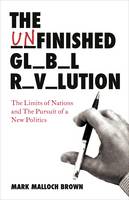Matthew Partridge learns more about Mark Malloch-Brown’s experiences at the World Bank, the UN and as a Minister in Gordon Brown’s administration.
The Unfinished Global Revolution: The Limits of Nations and the Pursuit of a New Politics. Mark Malloch-Brown. Penguin. February 2011.
Find this book at: ![]() Google Books
Google Books ![]() Amazon
Amazon ![]() LSE Library
LSE Library
 After Obama belatedly decided to support intervention in Libya, many American conservatives who had previously lambasted him for inaction cynically reversed their positions. Indeed, some of those out on the political fringes even claimed that the use of the “Responsibility to Protect” doctrine to justify the action was part of a wider assault on national security. It is therefore interesting to read The Unfinished Global Revolution: The Limits of Nations and the Pursuit of a New Politics by Mark Malloch-Brown, one of the leading supporters of a stronger role for global institutions.
After Obama belatedly decided to support intervention in Libya, many American conservatives who had previously lambasted him for inaction cynically reversed their positions. Indeed, some of those out on the political fringes even claimed that the use of the “Responsibility to Protect” doctrine to justify the action was part of a wider assault on national security. It is therefore interesting to read The Unfinished Global Revolution: The Limits of Nations and the Pursuit of a New Politics by Mark Malloch-Brown, one of the leading supporters of a stronger role for global institutions.
The title of the book is perhaps a misnomer since it is a memoir of Malloch-Brown’s career organized thematically, rather than an academic study of global governance. However, since Malloch-Brown has held senior roles at the World Bank and United Nations, briefly becoming Deputy Secretary-General, as well as a stint as a Minister in Gordon Brown’s administration, this is not necessarily a bad decision. From the controversy over the oil-for-food programme to the financial crisis of 2008, Malloch-Brown has been present at some of the pivotal moments in the debate over the future of global governance.
Indeed, few others have experienced the issue of debt relief from the point of view of debtor countries (as political consultant to President Aquino of the Philippines), creditor institutions and international development programmes. This ensures that his discussion of the issues surrounding economic development is balanced, honest and forthright. It also means that he is unafraid to admit that less developed countries need to do more to reform their economies, creditor institutions have to broaden their focus to include equity as well as growth and development bodies need to realize that debt defaults reduce the ability to borrow money in the future.
Unfortunately, Malloch-Brown is unable to deal with issues where he has only represented one side of the debate, in such an objective manner. His dislike of John Bolton, the controversial former United States Ambassador to the UN, means that he recasts the oil-for-food scandal as a witch-hunt, rather than an attempt to inject some much needed accountability into the organisation. The fact that he is only able to muster the incredibly weak defence that the real blame lies with the companies that violated the sanctions, rather than those ultimately responsible for supervising the programme, is particular telling.
While his loyalty to Kofi Annan is understandable, given that Annan intervened to get Malloch-Brown appointed the head of the United Nations Development Programme, his praise for the former Secretary-General goes too far. Statements such as “Kofi Annan’s apparently easy mastery of this context showed personal traits of leadership that work in today’s world….he expended huge emotional intelligence in trying to understand the people he dealt with”, look fatuous given Annan’s failure to prevent genocide in Sudan. Far from being, “certainly the greatest UN Secretary-General of all time”, Annan’s record looks relatively mediocre.
Malloch-Brown’s dismissal of the Bush administration’s foreign policy, and his contention that the Iraq war undermined acceptance of the “Responsibility to Protect” doctrine, is also dubious. Like the Iraq campaign, R2P rests on the principle that human rights and international security can trump national sovereignty in certain cases. Indeed, a cynic could argue that the only difference between the two is that Britain and America were prepared to commit ground troops and large amount of resources to keeping Iraq free, while R2P requires the formal agreement of Security Council members, such as Russia and China, and allows governments to sharply limit their involvement.
However, these criticisms aside, Malloch-Brown’s book is certainly worth reading. The fact that he concedes that there are downsides to international institutions, and even to globalization in general, means that it is more nuanced and convincing than similar works. It is also especially useful as a complementary work to some of the more theoretical tones on this subject.
Dr Matthew Partridge has recently completed a PhD in Economic History at the London School of Economics.
Find this book at: ![]() Google Books
Google Books ![]() Amazon
Amazon ![]() LSE Library
LSE Library




